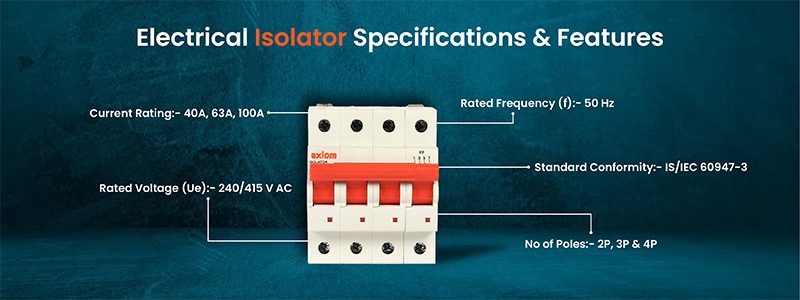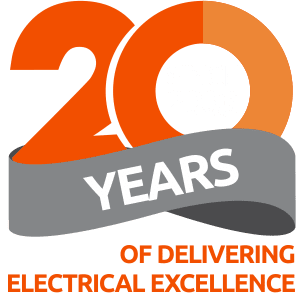
What is an Electrical Isolator?
An electrical isolator, also known as a disconnect switch or a circuit breaker, is a device used in electrical systems to physically disconnect or isolate a circuit from its power source. It provides a means to safely de-energize and isolate a section of an electrical circuit for maintenance, repairs, or emergencies.
A circuit’s power source must be disconnected entirely for an electrical isolator to effectively stop the flow of electrical current. This isolation is essential to ensure the security of anyone working on the circuit or to guard against equipment damage when performing maintenance or repairs.
Where are the Electrical Isolators used?
When it’s required to isolate or disconnect electrical circuits, electrical isolators are employed in a variety of applications & industries. Electrical isolators are frequently utilized in power distribution networks, industrial facilities, electrical panels and switchboards, renewable energy systems, & other locations.
It’s vital to remember that electrical isolators’ precise use and specifications might change depending on the industry, voltage levels, and legal norms in other nations. Electrical isolators must be chosen, installed, and used in specific circumstances by skilled electrical engineers or other specialists.
Electrical Isolator specifications & features
SALIENT FEATURES
The Electrical Isolator provides maximum energy efficiency while consuming little power and being reasonably priced. The Isolators are built to last and are reliable due to their long electrical and mechanical lives.
The convenience of energy-efficient, low-watt loss isolators offers a constant and uninterrupted power supply. Axiom Isolators are carefully designed to provide heavy-duty protection with petite frame size, making them an excellent option for various applications. You may have peace of mind from knowing you have invested in the best with our premium solutions.
TECHNICAL SPECIFICATIONS
- Standard Conformity:- IS/IEC 60947-3
- No of Poles:- 2P, 3P & 4P
- Current Rating:- 40A, 63A, 100A
- Rated Voltage (Ue):- 240/ 415 V AC
- Rated Frequency (f ):- 50 Hz
Common Problems & Troubleshooting Tips for Electrical Isolators
Like any other Electrical component, Electrical Isolators can encounter certain problems that may affect their functionality. Here are some common problems associated with electrical isolators and troubleshooting tips to address them:
- Defective Connections: Loose or corroded connections can result in poor electrical contact, rising resistance, overheating, or even failure. Check to make sure that all connections are securely fastened and corrosion-free. Periodically check and, if required, clean the terminals.
- Mechanical Wear: Over time, mechanical parts of isolators can experience wear and tear, leading to difficulty in operation or improper switching. Lubricate moving parts as recommended by the manufacturer and promptly replace worn-out components.
- Arcing or Tracking: Excessive arcing or tracking between switch contacts can cause damage to the isolator and affect its performance. Inspect connections for signs of burning, pitting, or carbon deposits. Clean or replace damaged contacts and ensure proper contact alignment.
- Overheating: Continuously high electrical loads or poor ventilation around the isolator can result in overheating. Ensure the isolator is adequately rated for the load it handles and installed in a well-ventilated area. Check for any obstructions or dust accumulation that may restrict airflow.
- Insulation Failure: Insulation breakdown can lead to short circuits or leakage currents. Regularly inspect the isolator’s insulation for signs of damage, cracks, or degradation. Replace any compromised insulation promptly.
- Incorrect Operation: Incorrect operation, such as improper switching sequence or exceeding the rated switching frequency, can cause damage to the isolator. Ensure operators are adequately trained on the correct operation procedures and adhere to the manufacturer’s guidelines.
Suppose you encounter persistent issues with an electrical isolator that cannot be resolved through basic troubleshooting. In that case, it is recommended to consult a qualified electrician or contact the manufacturer for further assistance. Safety precautions should always be followed, and authorized personnel should only work on isolators.
Axiom Controls is a manufacturer of LV Switchgear Products including – MCB, MCCB, RCCB, Isolators, Distribution Boards, and Two way center off changeover switch. We are looking for Dealers/ Distributors/ Channel partners. Fill out the inquiry form if you are interested.










